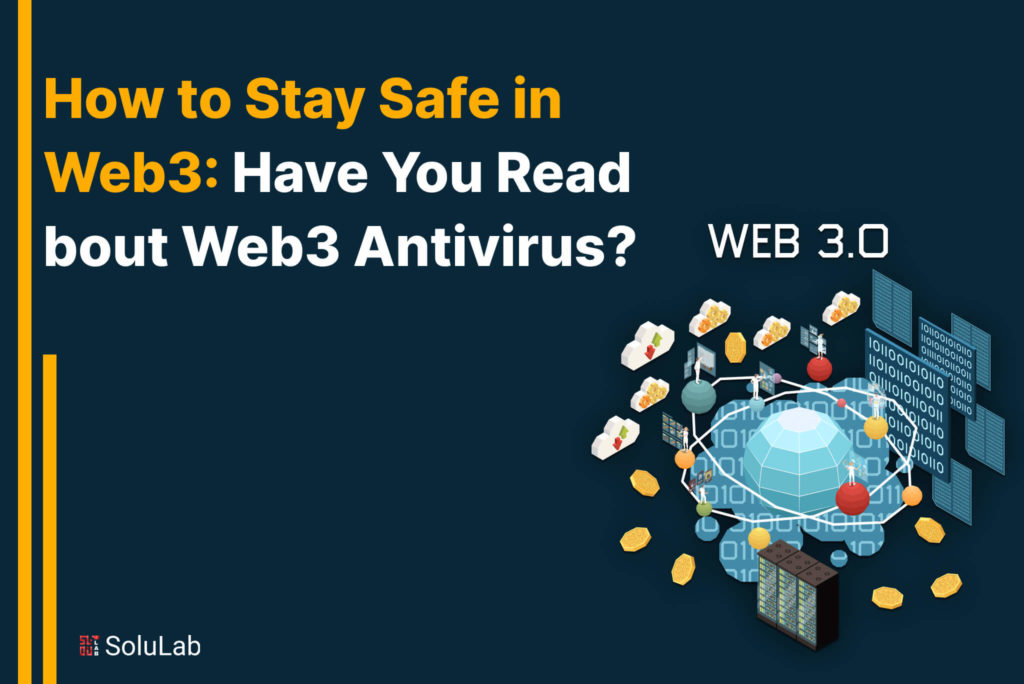
The digital landscape is evolving rapidly, and the emergence of Web3 is at the forefront of this transformation. Web3 platforms represent a new era of the internet, characterized by decentralization, blockchain technology, and the promise of enhanced security and user control. As Web3 gains traction, it’s crucial to understand the intricacies of staying safe within this innovative environment. In this blog, we’ll explore the concept of Web3, the unique security challenges it poses, and introduce you to the concept of Web3 antivirus.
What is Web3
Web3, short for “Web 3.0,” is a term used to describe the next evolution of the internet. Unlike the current web, which relies on centralized servers and authorities, Web3 is built on decentralized networks, enabling users to have more control over their data and interactions. It leverages technologies like blockchain, decentralized finance (DeFi), and non-fungible tokens (NFTs) to create a trustless and peer-to-peer online environment.
Key Concepts and Technologies
To navigate Web3 effectively, it’s essential to grasp some key concepts and technologies:
- Blockchain: The distributed ledger technology that underpins Web3, ensuring transparency and immutability.
- Smart Contracts: Self-executing contracts with the terms of the agreement directly written into code, often used in decentralized applications (DApps).
- Cryptocurrencies: Digital assets like Bitcoin and Ethereum, which facilitate transactions and value exchange in Web3.
Potential Risks and Vulnerabilities
While Web3 promises increased security, it also introduces new risks:
- Decentralization and Trust Issues: Trust in a centralized authority is replaced by trust in code, which can be vulnerable to exploitation.
- Smart Contract Vulnerabilities: Flaws in smart contracts can lead to financial losses for users.
- Identity and Privacy Concerns: Maintaining online anonymity and data privacy becomes more challenging in a transparent, blockchain-based environment.
Web3 Security Challenges
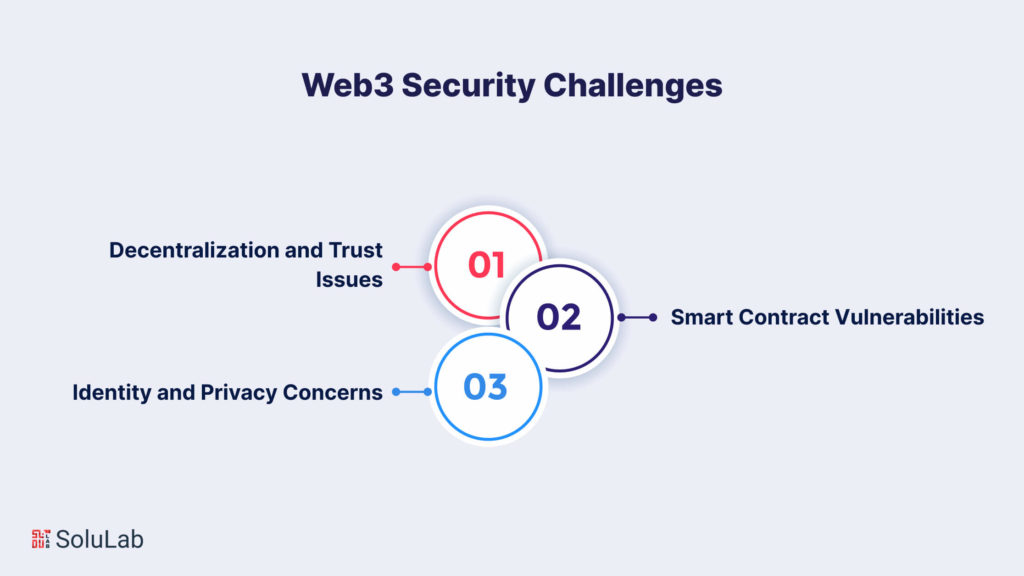
Web3’s decentralization and innovative technologies bring about unique security challenges that users must be aware of:
-
Decentralization and Trust Issues
One of the key principles of Web3 is decentralization, eliminating the need for intermediaries and third-party authorities. While this offers enhanced security in many aspects, it also shifts the burden of trust onto the code and the network itself. Users must trust that the underlying blockchain technology and the code governing smart contracts are secure. However, as with any technology, vulnerabilities can exist, making it imperative to exercise caution and due diligence.
-
Smart Contract Vulnerabilities
Smart contracts are a cornerstone of Web3, automating agreements and transactions without the need for intermediaries. However, smart contracts are not immune to errors or malicious intent. Vulnerabilities within these contracts can be exploited, leading to financial losses for users. It’s vital to thoroughly audit and review smart contracts before interacting with them to minimize such risks.
-
Identity and Privacy Concerns
Web3’s transparency and immutability can make maintaining anonymity and data privacy challenging. Transactions on the blockchain are publicly recorded, and while they may not always reveal personal information, they can still create privacy concerns. Users must take precautions to protect their identities and data, especially when participating in DeFi platforms or NFT marketplaces.
Strategies for Staying Safe in Web3
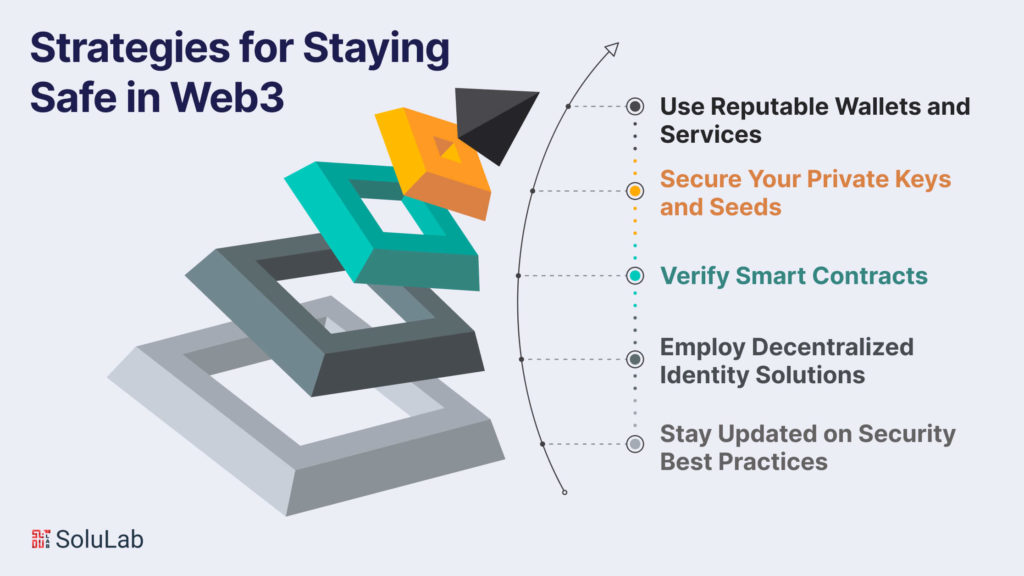
Navigating the decentralized and innovative world of Web3 can be both exciting and daunting. To ensure your safety in this evolving digital landscape, consider implementing the following strategies:
-
Use Reputable Wallets and Services
Selecting a trusted wallet and reliable Web3 services is a crucial first step. Reputable wallets, like MetaMask and Trust Wallet, offer a secure way to manage your digital assets and interact with DApps. Make sure to download these tools from official sources to avoid potential scams.
-
Secure Your Private Keys and Seeds
Private keys and recovery seeds are your keys to the Web3 kingdom. Safeguard them with the utmost care. Store them offline in hardware wallets or secure offline backups. Never share these sensitive credentials and be cautious of phishing attempts.
-
Verify Smart Contracts
Before engaging with any smart contract, take the time to review and verify it. Use resources like Etherscan to audit contracts and check for potential vulnerabilities. Ensure that the code has been audited by reputable security firms to minimize risks.
-
Employ Decentralized Identity Solutions
To protect your identity and maintain privacy, consider using decentralized identity solutions like blockchain-based identity wallets. These solutions provide you with control over your personal information and data, allowing you to share only what’s necessary.
-
Stay Updated on Security Best Practices
Web3 is continuously evolving, and so are the associated security threats. Stay informed about the latest security best practices and emerging threats by following trustworthy sources, forums, and communities in the Web3 space. Education is your best defense.
Web3 Antivirus: What You Need to Know
In the ever-evolving landscape of Web3, where decentralized technologies and digital assets have taken center stage, a new kind of security solution has emerged – Web3 antivirus. This innovative tool is designed to provide a much-needed layer of protection for users navigating the complex and decentralized Web3 environment. In this section, we will delve deeper into Web3 antivirus, exploring how it distinguishes itself from traditional antivirus software and why it is becoming increasingly essential in this dynamic digital realm.
Web3 antivirus represents a specialized security solution tailored to safeguard users within the decentralized and blockchain-based Web3 ecosystem. Unlike traditional antivirus software, which mainly focuses on identifying and neutralizing threats that target local devices, Web3 antivirus takes a different approach. It is designed to address the unique security challenges posed by Web3, such as smart contract vulnerabilities, DeFi scams, and identity theft on blockchain networks.
How Web3 Antivirus Differs from Traditional Antivirus
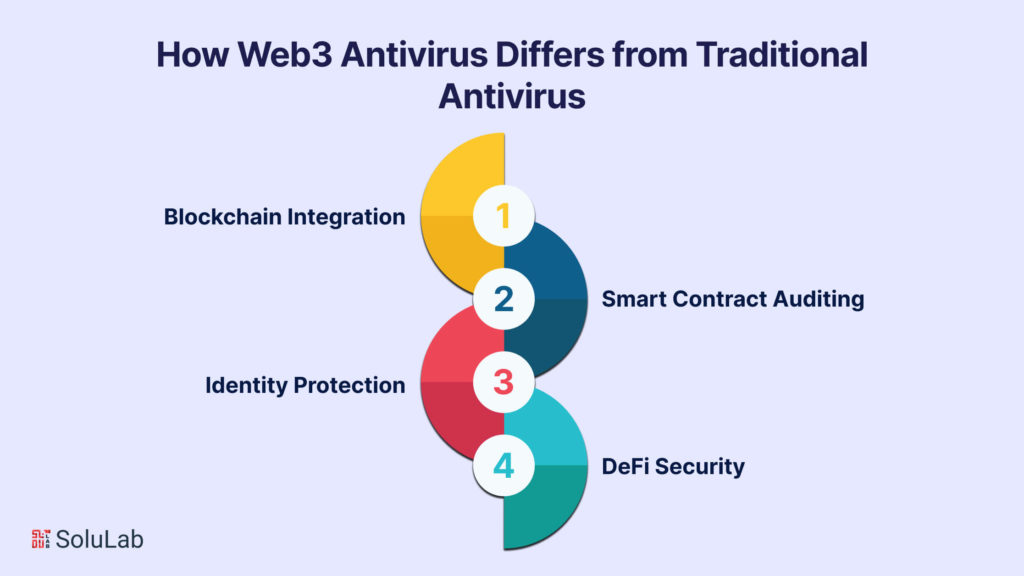
Understanding how Web3 antivirus sets itself apart from conventional antivirus software is crucial to grasp its significance:
- Blockchain Integration: Web3 antivirus operates in conjunction with blockchain technology. It continuously monitors blockchain activities, transactions, and smart contracts to detect and mitigate malicious actions. This real-time integration is vital in a trustless environment where every transaction is recorded and irreversible.
- Smart Contract Auditing: In the world of Web3, smart contracts play a pivotal role. These self-executing contracts have their terms directly encoded into code, but they are not immune to vulnerabilities. Web3 antivirus conducts automated audits of smart contracts, identifying potential weaknesses and vulnerabilities. This capability allows users to make informed decisions about engaging with specific contracts and helps avoid potential financial risks.
- Identity Protection: In Web3, your online identity and presence are intricately linked to your blockchain address. Web3 antivirus solutions often include features designed to safeguard decentralized identity. These tools enable you to maintain control over your personal information and data, allowing you to share only what is necessary while keeping the rest protected.
- DeFi Security: The rise of decentralized finance (DeFi) platforms in Web3 has brought both exciting opportunities and new risks. Web3 antivirus solutions enhance the security of DeFi activities by continually monitoring transactions and platforms for any suspicious activities or scams. This proactive approach can help users avoid falling victim to DeFi-related frauds and rug pulls.
Benefits and Limitations
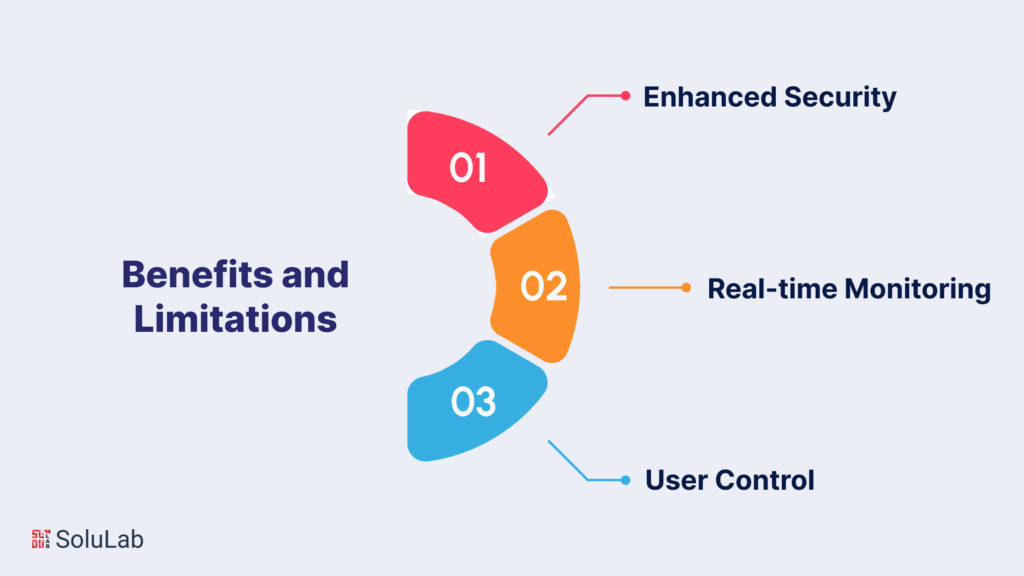
Web3 antivirus solutions offer several notable benefits:
- Enhanced Security: Web3 antivirus enhances security by providing specialized protection against threats unique to Web3. This includes but is not limited to smart contract vulnerabilities, DeFi-related scams, and identity theft. By addressing these threats, Web3 antivirus reduces the risk of financial losses and data breaches, promoting a safer Web3 environment.
- Real-time Monitoring: These solutions offer real-time monitoring of blockchain transactions and smart contracts. This continuous surveillance allows for the early detection of potential threats and vulnerabilities, which is crucial in a decentralized and fast-paced digital environment.
- User Control: Web3 antivirus solutions empower users with greater control over their security. The decentralized nature of Web3 can be both liberating and challenging. Web3 antivirus bridges the gap, offering users more control and peace of mind as they navigate this new frontier.
However, it’s essential to understand that no security solution is entirely foolproof. Web3 antivirus, while a valuable tool, should be used in conjunction with other security best practices. Users must remain vigilant and cautious when navigating the Web3 landscape. Security is a shared responsibility, and being proactive about protecting your digital assets and data is paramount.
Concluding remarks
In conclusion, as Web3 continues to shape the future of the internet, it’s crucial to stay informed about the evolving security challenges and embrace solutions like Web3 antivirus to protect your digital assets and data. By combining best practices and innovative security tools, you can explore the vast opportunities of Web3 with confidence.
The shift to decentralized systems, blockchain technology, and innovative digital experiences is accompanied by unique security challenges. To navigate this landscape successfully, users must adopt a proactive stance, combining established security strategies with cutting-edge solutions like Web3 antivirus. While Web3 promises a world of possibilities, it’s essential to remember that no security solution is infallible. By staying informed, cautious, and embracing the protective shield of Web3 antivirus, individuals can boldly explore the transformative Web3 world, secure in the knowledge that their digital assets and data are safeguarded. The journey through Web3 is exciting, and with the right security measures in place, it can be a safer one as well.
Solulab is a forward-thinking company at the forefront of the Web3 revolution, specializing in blockchain and decentralized exchange development solutions. With a commitment to innovation, Solulab offers a range of services, including blockchain development, smart contract creation, decentralized application (DApp) development, and blockchain consulting. In a world where Web3 security is of paramount importance, companies like Solulab play a vital role in providing cutting-edge solutions to ensure the safety and success of Web3 projects. Their knowledge and experience in blockchain technology contribute to a more secure and resilient Web3 environment, supporting the principles of decentralization, trust, and user empowerment.
FAQs
1. What is Web3, and why does it need special security measures?
Web3 represents the next generation of the internet, emphasizing decentralization and blockchain technology. It requires unique security measures due to the shift in trust from central authorities to code and the inherent risks in blockchain-based systems.
2. How does Web3 antivirus differ from traditional antivirus software?
Web3 antivirus focuses on protecting users in the decentralized Web3 environment. It monitors the blockchain, audits smart contracts, and offers specialized features like identity protection. Traditional antivirus software primarily scans for local device malware and may not cover blockchain-specific threats.
3.Why is it important to secure private keys and seeds in Web3?
Private keys and seeds are the keys to your Web3 kingdom, giving you control over your digital assets. Failing to secure them properly can lead to unauthorized access and loss of funds. Protecting these keys is vital in Web3.
4. What are the main security challenges in Web3?
Web3 security challenges include issues related to decentralization and trust, smart contract vulnerabilities, and identity and privacy concerns. Users need to be aware of these challenges and implement strategies to mitigate them.
5. Do Web3 antivirus solutions provide complete security?
While Web3 antivirus solutions offer enhanced security in the Web3 environment, no security solution can guarantee complete protection. Users should combine Web3 antivirus with other security best practices and remain vigilant to ensure their safety in Web3.






